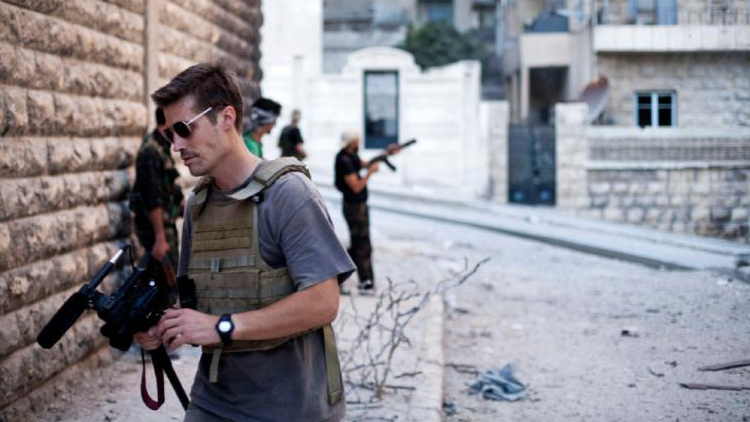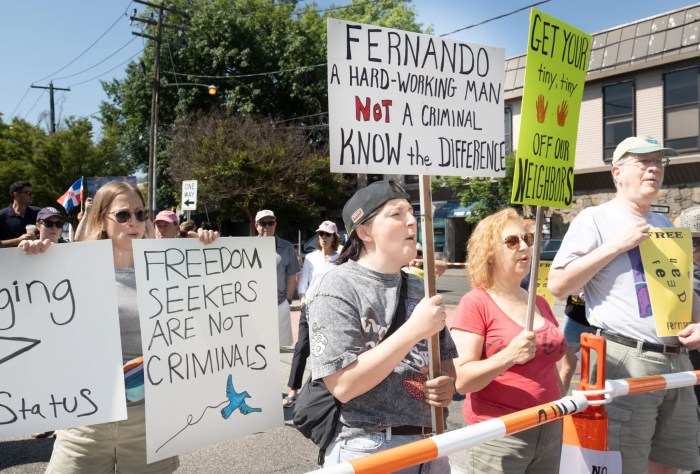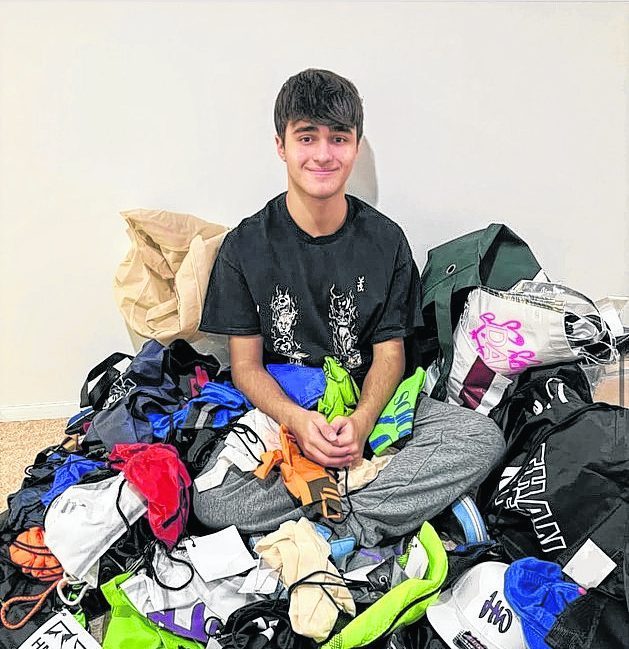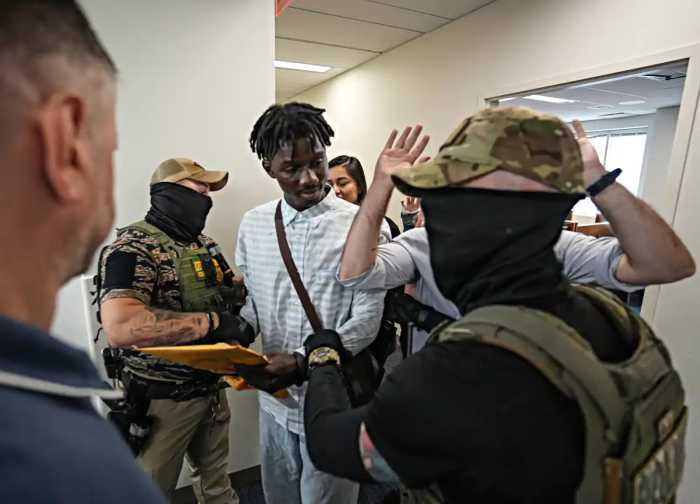President Obama issued a solemn address to the nation Wednesday in the wake of the beheading of American journalist James Foley, praising his life and work and vowing continued military action in Iraq to protect US interests and “extract this cancer” of the Islamic State, the militant group who murdered him.
“Jim was taken from us in an act of violence that shocks the whole world,” said Obama. “We are all heartbroken at their loss and join them in honoring Jim in all that he did.
“Jim Foley’s life stands in stark contrast with his killers,” he continued. “They have rampaged across cities and villages killing innocent, unarmed civilians in cowardly acts of violence. They abduct women and children and subject them to torture and rape and slavery. They have murdered Muslims—both Sunni and Shia—by the thousands. They target Christians and religious minorities, driving them from their homes, murdering them when they can for no other reason than they practice a different religion. They declared their ambition to commit genocide against an ancient people.”
“ISIL speaks for no religion,” said Obama. “Their victims are overwhelmingly Muslim, and no faith teaches people to massacre innocents. No just God would stand for what they did yesterday, and for what they do every single day. ISIL has no ideology of any value to human beings. Their ideology is bankrupt… People like this ultimately fail.”
“The United States of America will continue to do what we must do to protect our people. We will be vigilant and we will be relentless,” he added, calling upon other nations to join the fight against the group. “There has to be a common effort to extract this cancer, so that it does not spread.
“One thing we can all agree on is that a group like ISIL has no place in the 21st century.”
Obama’s statements were the first official confirmation of authenticity of a video posted on YouTube Tuesday depicting Foley’s beheading.
The 40-year-old had been missing since Thanksgiving Day, Nov. 22, 2012, when the car he was traveling in toward the Turkish border in northern Syria was stopped by four armed men. He had been reporting from the Middle East for the five years prior, and leading up to his disappearance had spent several weeks reporting inside Syria.
Until Tuesday there had been no direct contact with Foley, nor communication with his kidnappers or ransom demand, wrote Phil Balboni, president and CEO of online news outlet GlobalPost, where Foley was a contributor, in a note to staff on the year anniversary of his taking.
Besides the Syrian civil war, the freelance photojournalist from New Hampshire had reported on conflicts in Iraq, Afghanistan, and Libya, where he was once held captive for 44 days.
He appeared dressed in orange, on his knees with his hands bound behind his back in the gruesome five-minute video segment titled “A Message To America.” His murderer stood by his side wearing ISIS’ signature all-black cloaks and mask, a holstered gun slung across his shoulder and grasping a large blade.
Following forced anti-American remarks from Foley, his killer made threats against the United States, naming Obama, and then beheaded Foley before grabbing the neck of what the video purported to be Steven Soltoff, a TIME magazine contributor who disappeared in the region earlier this month. Soltoff is also kneeling in the sand, his hands bound. The masked man then warns Obama that his fate rests in Obama’s decision about continuing US airstrikes against the group.
ISIS, short for the Islamic State of Iraq and Syria—also known as the Islamic State of Iraq and the Levant (ISIL) and most recently, the Islamic State—proclaimed the creation of a caliphate, or Islamic state, across parts of western Iraq and northern Syria in June. Its leader, or caliph, is Abu Bakr al-Baghdadi, a militant once in US custody but released.
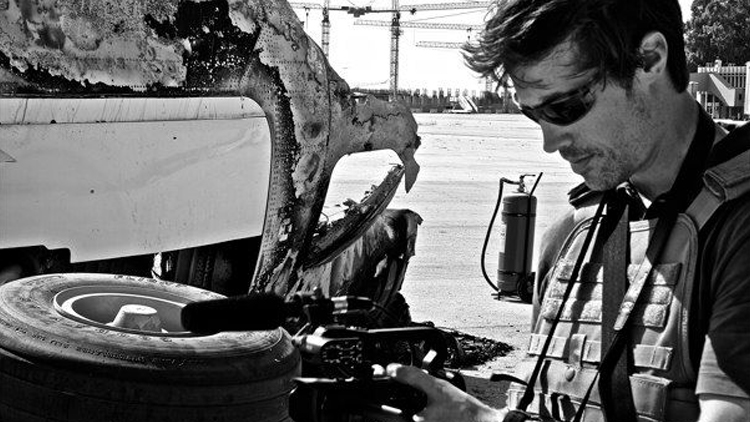
Hundreds of thousands have been forced to abandon their homes in the region and tens of thousands had sought refuge on a nearby mountain range, which led to a humanitarian crisis due to extreme heat, the shortage of water and food and medicine and lack of shelter. The United States, Britain and several other countries have been dropping food and water for the past two weeks and arming Kurdish fighters to help repel ISIS.
The Kurds have also successfully escorted tens of thousands to relative safety in makeshift refugee camps. Obama recently ruled out a US-led evacuation of Yazidis still stuck on the mountain, citing an assessment by about 20 US special forces deployed there that those displaced no longer faced an imminent threat. That decision and assessment has been widely criticized, as tens of thousands of Yazidis reportedly still remain in dire straits trapped on the south side of the mountain range.
There have been reports of Christian children being beheaded and mass executions with people being buried alive. ISIS has also reportedly abducted more than 1,000 Yazidi women, according to media reports from the conflict, who are feared to have become sex slaves and made to wed ISIS fighters.
An outpouring of support for Foley and his family and resounding condemnation against his barbaric mutilation continued to flood social media sites such as Facebook and Twitter Wednesday, with the Committee to Protect Journalists’ Chairman Sandra Mims Rowe issuing the following statement:
“The barbaric murder of journalist James Foley, kidnapped in Syria and held almost two years, sickens all decent people. Foley went to Syria to show the plight of the Syrian people, to bear witness to their fight, and in so doing to fight for press freedom. Our hearts go out to his family, who had dedicated themselves to finding and freeing Jim.”
Foley’s mom Diane honored her son in a post on the Facebook page “Find James Foley.”
“We have never been prouder of our son Jim,” she wrote. “He gave his life trying to expose the world to the suffering of the Syrian people. We implore the kidnappers to spare the lives of the remaining hostages. Like Jim, they are innocents. They have no control over American government policy in Iraq, Syria or anywhere in the world.
“We thank Jim for all the joy he gave us,” she added. “He was an extraordinary son, brother, journalist and person. Please respect our privacy in the days ahead as we mourn and cherish Jim.”
Two journalists with Long Island ties have also been victims of the Syrian conflict: Matthew Schrier, a Syosset native and photojournalist, escaped from ISIS rivals Nusa Front last summer after the group kidnapped him and Marie Colvin, an East Norwich native, was killed in 2012 while covering the Syrian civil war for The Sunday Times in London.
James Foley addresses students at Medill in 2011:




